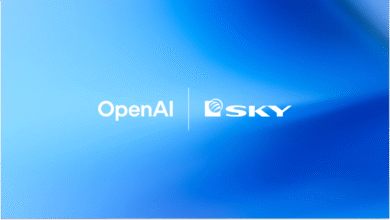Ex-Microsoft SEO Expert Reveals AI’s Hidden Threat to Search Rankings

▼ Summary
– The SEO industry is facing a fundamental shift due to AI agents, not just AI replacing search engines, according to SEO veteran Duane Forrester.
– Agentic AI systems will enable individuals to operate like small agencies by autonomously executing tasks, requiring professionals to focus on higher-value activities.
– Content creators must adapt by transitioning from writing to instructing AI agents, managing outputs, and refining tone and accuracy.
– Strategic roles like CMOs remain safe from AI disruption as they require experience-based decision-making and complex problem-solving.
– Companies must update hiring and training strategies now to prepare employees for AI-integrated roles or risk obsolescence.
The digital marketing landscape is undergoing a seismic shift as AI transforms how businesses approach search visibility and content creation. Rather than simply replacing traditional SEO tactics, artificial intelligence is reshaping the entire ecosystem, with profound implications for professionals who fail to adapt.
A conversation with industry veteran Duane Forrester, former Microsoft SEO lead and architect of Bing Webmaster Tools, reveals an unexpected threat: the rise of autonomous AI agents that could redefine marketing workflows. These systems don’t just assist with tasks, they execute them independently, allowing individuals to operate like full-scale agencies.
Forrester emphasizes that the real disruption lies in “Agentic AI,” intelligent systems capable of handling complex assignments with minimal human oversight. Imagine briefing a dozen AI writers simultaneously, then refining their output instead of drafting from scratch. This evolution turns content creators into strategic editors, focusing on nuance, brand alignment, and accuracy rather than manual writing.
Traditional writing roles face obsolescence, but skilled professionals who master AI collaboration will thrive. The key lies in transitioning from hands-on creation to high-level instruction and quality control. “If your job revolves solely around writing, it’s at risk,” Forrester notes. “But those who learn to direct AI teams effectively will become indispensable.”
Interestingly, strategic positions like Chief Marketing Officers remain resilient because they require human judgment, interpreting consumer behavior, identifying revenue opportunities, and solving complex business challenges. AI excels at repetitive tasks but struggles with experience-driven decision-making.
For businesses, the imperative is clear: upskill teams now or risk falling behind. Forward-thinking companies are already rewriting job descriptions to emphasize AI management and strategic oversight. Training programs must prepare employees for hybrid roles where they orchestrate AI tools rather than perform manual work.
The parallels to SEO’s early days are striking. Just as marketers once adapted to algorithm updates, today’s professionals must embrace AI as a force multiplier. Success hinges on leveraging automation to amplify human expertise, not replace it. As Forrester puts it, “This isn’t about survival, it’s about seizing the advantage in a transformed industry.”
For deeper insights, explore Forrester’s analysis on vector-based search and AI-driven content at his platform, where he deciphers these emerging trends for marketing leaders. The future belongs to those who view AI not as a threat, but as the ultimate productivity partner.
(Source: Search Engine Journal)





